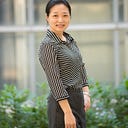Labor of Love, Reward or Calling?

My student Ray, a 12th grader, sent me his weekly journal from the Asian Physics Olympiad (APhO) Training Camp. National elimination rounds involving a multi-stage selection and training process were held to determine the eight most promising new talents, who then would go on to participate in the APhO. He felt excited upon learning he was chosen as one of the final competitors, yet he found it too good to be true for fear that he might not be ready for the APhO competition.
I joked that Ray was in the “Concentration Camp” because he needed to solve countless physics problems the instant he read them and did complicated experiments beyond comprehension. Life there was dull, monotonous, and tedious. It was in the training camp that he began to wonder whether he should choose Physics as his major just because he’s good at solving Physics problems. He used to insist on never attending a university in his hometown Hsinchu. However, after staying in the training camp for more than one month in Taipei, his strong belief was shattered. He questioned whether his enthusiasm for Physics would wane in the course of time since no firm belief could be unshakable.
I recalled my high school days when English was my favorite subject, and consequently it became my major in college. I had no idea whether my learning English was driven by my pleasure or my teacher’s recognition. It was like a chicken-and-egg situation to me. The question remained unsolved until my graduate school. My advisor kept encouraging me to pursue my PhD after I completed my MA thesis research. He tried to persuade me in an exaggerating way like “the academia would suffer a great loss” if I didn’t continue to dedicate myself to this field. Those were remarkable compliments from an eminent and gentle scholar. I was afraid that I could not live up to his expectation. I contemplated my decision for long by asking myself questions: Do I love doing research itself with all its concomitant sacrifice? Do I love conference travel more than writing a research paper? Is my passion for Linguistics great enough to follow the PhD program through? These questions were hard to answer when I looked forwards. My road ahead was shrouded in mist.
While I was writing my acknowledgements in my thesis, it dawned on me that the gorgeous human contact served as a hook with which my interest in Linguistics anchored itself to research. Why not have more human contact and create more profound impact on people? My motivation to be a secondary school teacher was strengthened through taking courses provided by the Center for Teacher Education. The only one I dared not face up to is my advisor.
My advisor played the role of a father figure to me. My parents divorced when I was little, and my mom brought up five children alone. Fatherly love had been an abstract concept until it was embodied in my advisor’s teaching and care. I grew into a confident young woman in the face of research under his instruction and guidance, yet I was intimidated at the crossroads of life because I had aspired to win his approval. I could hardly bear the pain to see his disappointment.
Since I earned my MA degree with a teaching certificate, I have been working as an English teacher in a senior high school. I kept in with my advisor. Every year he would tell me that I needed to make up my mind to pursue PhD in Linguistics and that he would write me a strong recommendation letter. One day after six years passed, he called and said, “This is the last time I asked you to.” An epiphany came that he would retire that summer. I cried when I hung up.
I wanted to gain his acceptance just by being myself.
I have found pleasure and meaning in my teaching job for more than 15 years. I love my students. Nevertheless, there were moments of frustrations and bewilderment that I felt I might not be suitable for being a high school teacher, especially when I encountered obstacles to inspiring and shaping the minds of the future. I have endeavored to help and make changes, and the most difficult part for me is to wait and be slow to judge. I have a propensity to get eagerly impatient to see progress or rewards, yet life under construction may not respond as mapped out. I am always struggling hard to bridge the gap between expectations and realities. Adversities and losses are there for reasons. Despite pains, brick walls help us to live each day anew, assessing whether we are doing our calling. When we are not knocked out, we become tougher, and we find what we love as great work.
One of the most precious lessons I have learned is to honor and respect my students’ goals without imposing my own goals on them. They feel loved only when they are loved as they are. That was how I had longed to be treated as a student. I learned it the hard way.

It is graduation season. With Ray and all the other graduates-to-be anticipating their future, I become reminiscent of my old school days. Looking backwards, I have connected the dots in life, and a growing self-awareness lights up the path upfront. I wish that for my students as they graduate.
